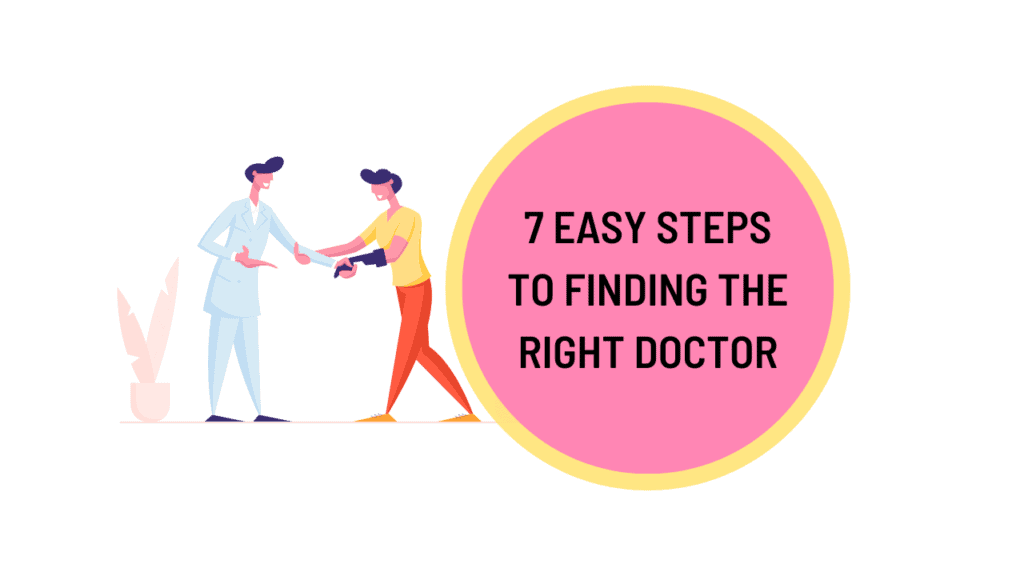
As a patient, it’s important to find a doctor who’s not only knowledgeable and skilled but also the right fit for your needs and preferences. Choosing the right doctor can make a significant difference in the quality of your care and outcomes of your treatment so it’s important to dedicate some time to this.
In this article, I’ll be going over how to find the right provider for your healthcare concerns. It’s always good to do a little research, since everyone’s different. Without further ado, here are seven easy steps to help you find the right doctor. 🙂
Table of Contents
Step #1: Research Your Condition
The first step in finding the right doctor is to understand your medical condition and its treatment options. This will help you to know what type of doctor to look for, and it’ll also enable you to make informed decisions about your care.
You can start by learning about your condition on reputable websites such as the Mayo Clinic or Healthline
or Healthline . You can also talk to your primary care doctor to get more information.
. You can also talk to your primary care doctor to get more information.
Step #2: Ask for Recommendations
One of the best ways to find a good doctor is to ask for recommendations from people you trust, such as your friends, family members, and coworkers. They may be able to recommend doctors who have provided them with excellent care and who have the qualities and expertise that you are looking for.
You can also ask your primary care doctor for referrals to specialists in your area who have experience treating your condition. Depending on your type of health insurance plan, a referral by a primary care physician may or may not be required to see a specialist.
Important Note: Be sure to double check any provider recommendations with your insurance to make sure that they are an in-network healthcare provider. If you see a provider who is not in-network (aka not covered under your insurance), then you might get stuck with hefty medical bill. (We don’t want that!)
For more information on in-network care, quickly head over to my “4 Steps To Find The Best Healthcare Provider (For Your Insurance)
” article. In it, I go over what an in-network provider is, as well as how to know if a particular provider that you’re interested in is considered in-network.
Step #3: Check the Doctor’s Credentials
Before making an appointment with a doctor, it’s important to check their credentials to ensure that they are qualified and licensed to practice medicine. You can check their credentials on the website of your state’s medical board, which should list their education, training, and professional experience. Other options include Healthgrades or the American Board of Medical Specialties (ABMS)
or the American Board of Medical Specialties (ABMS) .
.
Pro Tip: Try to look for a doctor that is Board-certified. Even though Board certification isn’t a requirement for practicing medicine, it indicates that a physician has passed rigorous testing in a particular specialty or subspecialty and signals greater competency and a higher standard of care.
To find out if a doctor is Board-certified, click here
.
Step #4: Consider the Doctor’s Philosophy and Approach
A good doctor is not only knowledgeable and skilled, but also someone who shares your values and beliefs about medical care. You should consider whether the doctor’s philosophy and approach to treatment align with your own preferences and expectations.
For example, if you’re looking for a doctor who is open to alternative or complementary therapies, you should look for a doctor who has experience with these approaches and who is willing to discuss them with you (e.g. a Doctor of Osteopathic Medicine or DO ).
).
Step #5: Consider the Doctor’s Availability and Accessibility
A good doctor is not only someone who is highly qualified and experienced but also someone who matches what you’re looking for in terms of availability and accessibility. When it comes to finding a doctor, you should consider how easy it is to schedule appointments with the doctor, how long you have to wait for appointments, and how responsive the doctor is to phone calls and emails.
For instance, if you’re expecting a greater frequency of visits (e.g. prenatal care or managing chronic conditions), then you’ll want to look for a doctor who isn’t booked out for months in advance and is relatively easy to get a hold of in urgent situations. Some other factors to consider are office location and disability accessibility.
Pro Tip: If you have an urgent medical situation but aren’t able to get a visit with your doctor for whatever reason, one option you might want to consider is going to urgent care. Urgent care can be a great alternative for non-emergency instances when you still require medical attention in a timely manner.
To get a better idea of the differences between primary care, urgent care, and emergency care, be sure to check out my “How To Decide Between Primary Care, Urgent Care & Emergency Care
” article! There, I go over which medical situations call for which type of care. 🙂
Step #6: Consider the Doctor’s Communication Style
A good doctor is able to communicate effectively with their patients. Therefore, you should also take into account whether the doctor is able to explain medical concepts in a way that is easy for you to understand and whether they are able to listen carefully to your concerns and answer your questions.
Along the same line, if you’re someone who speaks a different language or has certain cultural values, then you might want to take those factors into account when searching for a doctor. Another component that you may want to consider is the doctor’s ability to provide you with written information and resources that can help you to manage your condition.
Step #7: Consider the Doctor’s Bedside Manner
The final consideration we’re going to talk about is bedside manner. Bedside manner refers to the way in which a doctor interacts with and communicates with their patients, particularly during a medical examination or treatment. It includes the doctor’s demeanor, tone of voice, and overall approach to patient care.
Ideally, a doctor should demonstrate good bedside manner. A good bedside manner is characterized by a compassionate and caring attitude, good communication skills, and the ability to put patients at ease. You should consider whether the doctor is able to make you feel comfortable and at ease, and whether they are able to provide emotional support and reassurance when you need it.
Finally, you should also consider whether the doctor is able to involve you in decision-making and to respect your autonomy and preferences.
Food for Thought: Good bedside manner is highly important. That being said, I wouldn’t suggest writing a doctor off solely due to poor bedside manner because it doesn’t always mean poorer care.
My advice is to take bedside manner into account but have it be one factor amongst many others. You should examine all other aspects of care before deciding that you don’t want to continue care with a doctor. A lot of excellent doctors don’t have the best bedside manner, but the quality of their care is exceptional.
Conclusion
Well done on making it to the end of this article! You should be proud of yourself for taking such initiative in your medical care and personal health. 🙂
For more related information, be sure to check out some of my other articles on finding a healthcare provider ! See you in the next one. As always, stay healthy and keep learning.
! See you in the next one. As always, stay healthy and keep learning.
